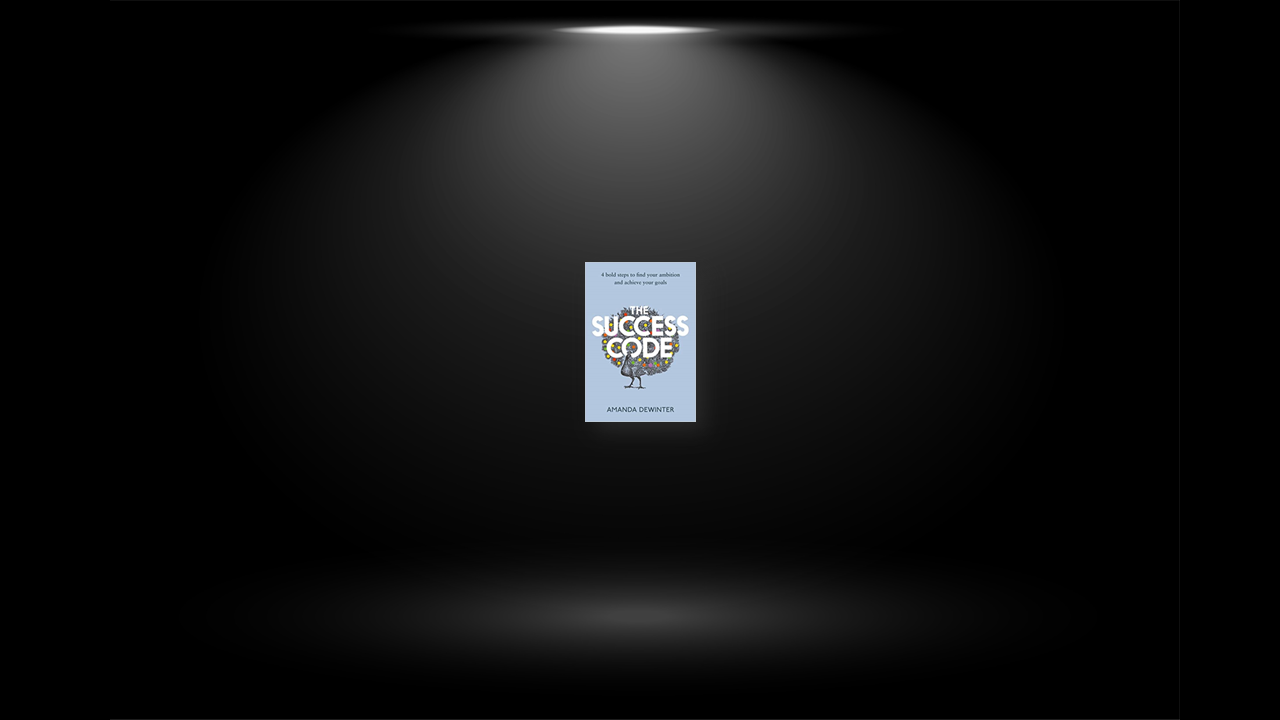Define Success
Success is open to each and every one of us. To achieve it you have to really want it, work out the best ways to learn and make progress towards it, take care of yourself and keep going until you get there. That’s what we’ll be covering in the four steps of The Success Code. Here in Step One, we’re focusing on finding and nurturing your ambition, enabling you to develop the drive and motivation to achieve success, firmly on your own terms.
When people think about success, they tend to think very narrowly, focusing on only one criterion: getting the right job title and salary in the workplace or the right grades in studies, or the right car or the right handbag. But, like life in general, we can’t measure success by one criterion alone.
Get the balance right! Sometimes I meet people who lose sight of what they truly value. For example, people can be initially convinced that success is based on money and status. They work hard and achieve these things, but inevitably at some point down the line they realise that neither ‘reward’ on their own is a true indication of success. Having loads of money and a fancy car but being too stressed to enjoy it doesn’t feel like success.
Real, genuine success is made up of many parts. Suppose you have a good job that leaves you feeling unfulfilled. Will you feel successful? Or suppose you got the best grades in a set of exams but were so stressed you feel you never want to face another challenge again? Or perhaps you neglected another area of your life that was really important to you? Neither scenario is likely to make you feel successful.
You may want your picture of success to include feeling well and being healthy, keeping up relationships with family and friends and enjoying life. You’ll want to challenge yourself to do as well as possible in all areas of your life but also to keep things in perspective, create a balance and keep sight of what’s important to you.
Make Learning Easier
All new learning is based on what you already know. If you know very little, it’s hard to learn anything new. When you know lots, it’s easier to learn more – because it’s easier to understand. You have a bank of knowledge to provide context and structure. So, the more knowledge you have, the easier it is to add more.
Check you’re up to date
To make new learning easier, check that you’re up to date with any previous learning that is relevant to what you’re doing now. If you’re not up to date, take the time to catch up. This may seem time-consuming and it will take effort, but it will make what comes next much easier. If you’re soon to start a new course, check to see if you’ve done everything you need to do beforehand, including any pre-course work. It really will be easier for you when you start.
Build knowledge familiarity
Starting a new topic can be overwhelming. Everything is new: the vocabulary, the terms, the context, everything. The more familiar you are with what you’re learning, the easier it will be. Try to get more familiar with the topic as soon as or even before you start learning it.
So look over the study materials and text books and do any prep work set. Find your own ways of becoming familiar with the topic. For example, watch a documentary, film, TV programme, YouTube video, read a related book (fiction or non-fiction), watch a film, talk to other students, visit a place of interest such as a museum, gallery or theatre. There are many ways to introduce yourself to new topics, and once you start looking out for them, you are more likely to spot them.
Make facts meaningful
Rather than learning information by rote, make it meaningful. Connect the new knowledge to that which you already have – your prior knowledge. While there are ways to make your learning easier, the most important thing is you. Only you can do the learning. No one else can learn for you.
The effort you put into learning will make a big difference. The more effort you put in, the easier it will get. It doesn’t matter how the people around you may badger you to work or whether you know there is an ominous deadline looming, only you can do the actual learning. You can be cajoled or pressurised, but only you have control over the effort you put in and whether you really learn. It’s in your hands, so make the most of the opportunities you have.
Refresh and Recharge
Burnout, to a greater or lesser degree, is normal and likely to happen to all of us at some point in our lives, so don’t feel like there is anything wrong with you. See burnout for what it is: a warning that your current situation is bad for you. Remember that change, even though hard, is necessary.
Recognise the warning signs of burnout – when you are tipping from feeling stressed yet productive to being overwhelmed and unable to cope. This feeling of overwhelm is temporary: it will pass and you can reverse any damage done, but it is time for you to act. It is time to pause and, if necessary, change direction. Urgently prioritise looking after your wellbeing; the need to refresh and recharge is essential. Stop, pause and reflect on what it is you need to do next.
Ask yourself: What do I need? If you need a break, how can you schedule it? Take time to work out what your problems are and how you can solve them. Then come up with an action plan to ensure you address those problems. Put in place preventative measures. Don’t be hard on yourself; that’s not what you need! Do you need a break from technology? Time to relax? Do you need to take better care of yourself? Do you need a creative outlet?
Turn to people for help. Reach out to those closest to you. Open up and confide in those you are close to. Don’t feel you are being a burden; confiding in someone brings you closer. Join or create a support network. Speak to your boss or HR department to find out how they can support you.
Reframe the way you look at your work. Remind yourself of your sense of purpose. Remember why you are working or studying, your vision for your future. Now is the time to avoid perfectionism and self-criticism. Re-examine your mindset to ensure that’s offering support. Re-evaluate your priorities. Set boundaries and don’t overextend yourself. Work out how to improve your work-life balance.
When you step back and take time to look after yourself, give yourself what you need and prioritise your wellbeing, you will find that the feeling of burnout will pass – and you can return to your usual self.
Success isn’t about doing it all. Success is about deciding what you want and going for it. Prioritise your wellbeing and take good care of yourself, and you will be in the best position to achieve.
Focus
Whether it’s spending time learning, creating or innovating, you will have to dedicate yourself to hours and hours of attention and concentration to achieve your goals. This time needs to be uninterrupted time, when you can focus on the tasks and activities you want to complete. Cal Newport, a computer science professor at Georgetown University, introduces the concept of deep work which he describes as ‘professional activities performed in a state of distraction-free concentration that push your cognitive capabilities to their limit’ and differentiates it from shallow work, which is ‘non-cognitively demanding, logistical-style tasks, often performed while distracted.’
It is only when we do deep work that our efforts create new value and improve our skills. If we want to develop and grow, we need to spend time committed to deep work. Deep work requires time and single-minded focus, but this is hard when you get distracted. To make it easier to focus, you have to do everything you can to eliminate distractions at the times you want to dedicate to deep work. There are two very specific things you can do to eliminate distractions: take control of your online connections and create the right environment.
If we want to develop focus in a hyperconnected world, we must find the right balance. Digital tools are not inherently bad; some of them are important and valuable to our success and happiness, but it is often the case that we spend far too much time using them. Cal Newport asks us to remember that digital tools are developed by private companies, funded lavishly, marketed carefully, and designed ultimately to capture and sell your personal information and attention to advertisers
We must take great care that they do not derail us, and prevent us from focusing deeply. Ensure that wherever you are working, you have to hand the right equipment. You want to be able to focus, and not be distracted because you can’t find what you need. Big organisations and largescale projects, such as professional sports teams and film productions, employ equipment managers specifically tasked with looking after all the equipment. If you’re not working in an organisation, be professional with your approach, and be your own equipment manager. Prepare everything you’ll need in advance, whether it’s a computer, back-up, access to a printer, cartridges and printer paper; stationery, pens, pencils, highlighters, notepads; books; files, file dividers; accessories, such as a table lamp and bin; specialist equipment; or storage space such as bookshelves, drawers and a cupboard.
Then organise your environment to create a designated place for things so they are easy to locate when you need them. Put all your stuff in the right place, all designed to stop distractions from interrupting you when you want to focus.


